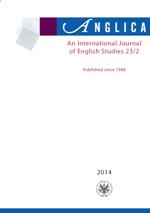From spatial concepts to time in the history of English: continuity and remoteness in time* Metonymy and metaphor
From spatial concepts to time in the history of English: continuity and remoteness in time* Metonymy and metaphor
Author(s): Xavier DekeyserSubject(s): Language and Literature Studies
Published by: Wydawnictwa Uniwersytetu Warszawskiego
Keywords: continuity in time; remoteness in time; metaphorization; metonymization; grammaticalization; algates; always; ago
Summary/Abstract: The study highlights the transition of the temporal adverbs always/algates, expressing continuity in time, and ago, expressing remoteness in time, from their historical prototypical concept of space to that of time and beyond. In these processes both metonymy and metaphor play an important role. The data regarding always and algates suggest a gradual cline from SPACE to TIME and an array of other meanings, subsumed under the cover-term UNCONSTRAINEDNESS. The SPACE-TIME-X chain (with X standing for other more abstract meanings) seems to occur in most languages. The semantic development of these adverbs also features all the properties associated with a change like this: metonymy followed by ever increasing or proliferating metaphorization, fuzzy or non-discrete categories (mostly in the stages of transition). Ago owes its origin to the grammaticalization of the past participle of a verb of movement. This spatial concept is metaphorically mapped on to a new temporal prototype. As compared with always/algates, the temporal frame of ago is monosemous and marked throughout by metaphorization from ‘remoteness in space’ to ‘remoteness in time’.
Journal: ANGLICA - An International Journal of English Studies
- Issue Year: 23/2014
- Issue No: 2
- Page Range: 63-75
- Page Count: 13
- Language: English

